Clever Duck (3 page)
Authors: Dick King-Smith

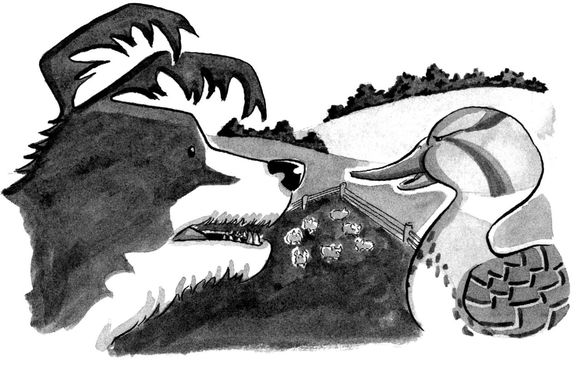
A Lovely Little Scheme
Now, in summertime some months later, as they stood and looked at the seven sows, Rory said, “Why have you got your feathers in a twist anyway? What did they say to you?”
“One of them asked me the meaning of a word,” said Damaris. “Pretended she didn't
know it. I was watching her before, going around to the cows and to the sheep, and she spoke to a hen, too, tried it on all of them, I bet.”
know it. I was watching her before, going around to the cows and to the sheep, and she spoke to a hen, too, tried it on all of them, I bet.”
“What word?” said Rory.
“âIgnoramus.' As if I didn't know.”
“Typical,” said Rory. “Trying to make other animals feel small. I've got a good mind to go out there and bite one or two of their fat backsides. Oh, they're so smug!”
“Look!” said Damaris. “There's another one coming to join them.”

“That's the boar,” said Rory, “and that's exactly what he is.”
“How d'you mean?”
“Haven't you ever heard him? Wordy, pompous, opinionated, thinks he's always right about everything, never listens to anyone else. The sows are bad enough, but he's
the biggest bore of the lot. Listen to him nowâ
grunt, grunt, grunt, snort, snort
âwhat rubbish he's talking.”
the biggest bore of the lot. Listen to him nowâ
grunt, grunt, grunt, snort, snort
âwhat rubbish he's talking.”
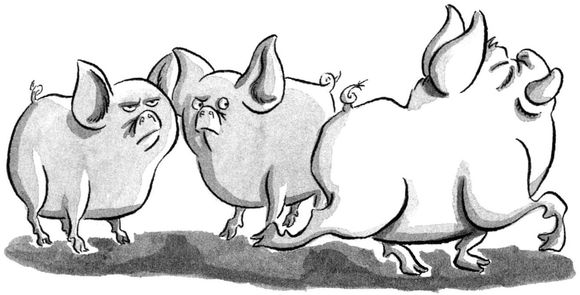
In fact, the boar was indulging in his usual reply to his wives' usual greeting. The registered name on his pedigree was Firingclose General Lord Nicholas of Winningshot, but the sows simply called him General.
“Good morning, General,” they all said as he came squelching through the churned-up
paddock. Then, with an inward sigh, each one of them tried hard to put her mind into neutral, knowing only too well what was coming.
paddock. Then, with an inward sigh, each one of them tried hard to put her mind into neutral, knowing only too well what was coming.
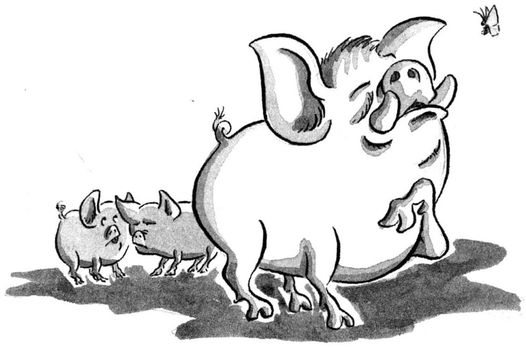
“Ah, ladies,” said the General in his deep voice. “Once again I find that I must question your customary greeting. There is no doubt that it is morning, but what precisely do you mean by âgood'? Virtuous? Pious? Kind? Well behaved? Worthy?”
“Sure, and it isn't raining, General,” said Mrs. O'Bese.
“But,” said the General, “is the absence of rainfall in itself good? Observe, for example, yonder duck, which to my surprise is consorting with a dog, an unlikely partnership in my opinion, of mammal and bird, of predator and prey, of ⦠what was I saying?”
“Yonder duck,” said Mrs. Stout.
“Ah yes,” said the General, “I recall. We were discussing the word âgood.' Such a beautiful morning as this may be good for us pigs, but I think, ladies, that we all know what kind of weather best pleases ducks.”
“Rain,” said Mrs. Portly, Mrs. Chubby, Mrs. Tubby, Mrs. Swagbelly, and Mrs. Roly-Poly in tones of deepest boredom.
“Exactly,” said the General.
He moved ponderously toward the orchard fence.
“Now then,” he said, “I hope that all you ladies
realize, thanks to my brief explanation, that what is a âgood' morning for a pig may not be a âgood' morning for a duck. Have I made myself clear?”
realize, thanks to my brief explanation, that what is a âgood' morning for a pig may not be a âgood' morning for a duck. Have I made myself clear?”
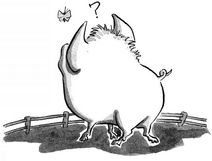
There was no reply, and the boar turned around to see that the seven sows had made themselves scarce.
“See what I mean?” said Rory. “He's bored 'em all to tears.”
“Oh, Rory!” Damaris cried. “He's worse than the sows! I don't know how they can stand him.”
“I don't know how we stand the lot of them,” said Rory. “Not all farmers keep pigs, you know, Mom told me. We're just unlucky.â³
Damaris was silent for a while, thinking.
Then she said, “You spoke of âkeeping' pigs. Well, that means managing them, looking after
them, feeding them, and so forth, I know that. But it also means keeping them
in
, doesn't it? There's pig netting all around their paddock. But down the other end, near the road, there's a gate.”
them, feeding them, and so forth, I know that. But it also means keeping them
in
, doesn't it? There's pig netting all around their paddock. But down the other end, near the road, there's a gate.”
Rory sat up abruptly.
“You mean ⦠?” he said.
“I mean,” said Damaris, “that if somehow or other that gate was opened, then those patronizing sows and that pontificating boar might just ⦠whatâ²s the word I'm looking for?”
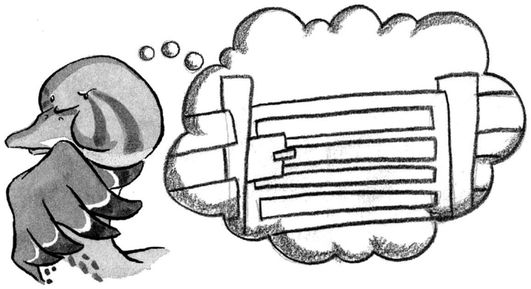
“ ⦠Emigrate!” cried Rory. “Damaris, you're a genius! Let's go and have a look at that gate right now. Race you!” And away he ran.
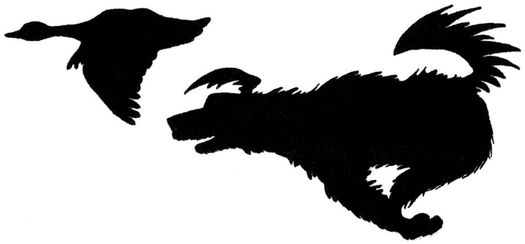
Damaris flew directly across the muddy pig paddocks, but so speedy was the sheepdog that they arrived at the gate at much the same time. Rory stood on his hind legs to examine its fastening. Then he dropped back down with a growl of disappointment.
“Hopeless!” he said. “There's a special sort of bolt we could never pull back, and worse, it's padlocked.”
Damaris ducked under the metal gate, whose bars were too close together to admit more than a pig's snout. She splattered about in the mud, testing it with her bill.
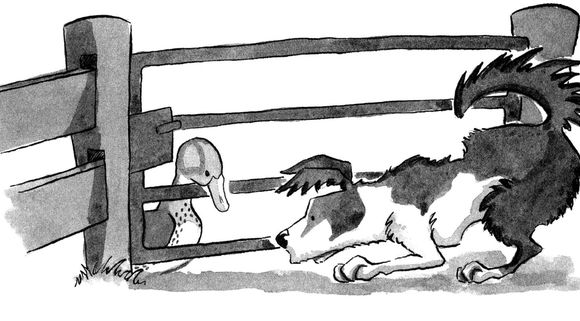
“We don't need to open the gate,” she said.
“Oh, look,” said Rory, “ducks may fly, but pigs can't. How are they going to get over it?”
“Under it,” Damaris said.
“They're far too big.”
“Not if a hole was dug under the gate,” said Damaris. “A great big hole. In this nice soft earth. By you.”
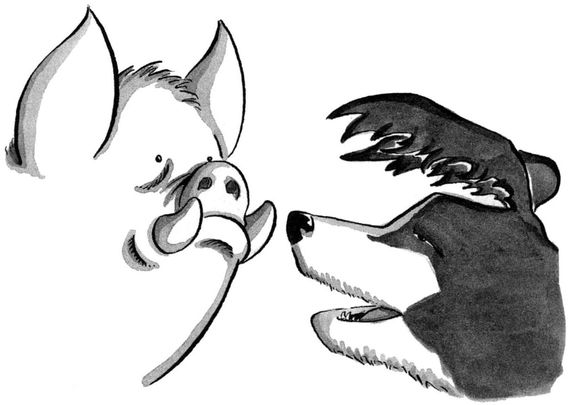
Pigs Stopped Play
Very early the following morning, Rory did indeed dig that hole. Then he woke the pigs and said to the boar, very respectfully, “Would you be good enough to follow me, sir?”
At the gate he said, “Be kind enough to put your head under here, sir, and give a heave.”
And, as the sows watched, the General put his
great head in the hole and gave an almighty heave. Up came the gate, right off its hinges at one end, while at the other end, the bolt bent and the padlock snapped. Then down crashed the whole thing and away down the road went the sows, marching behind their master.
great head in the hole and gave an almighty heave. Up came the gate, right off its hinges at one end, while at the other end, the bolt bent and the padlock snapped. Then down crashed the whole thing and away down the road went the sows, marching behind their master.
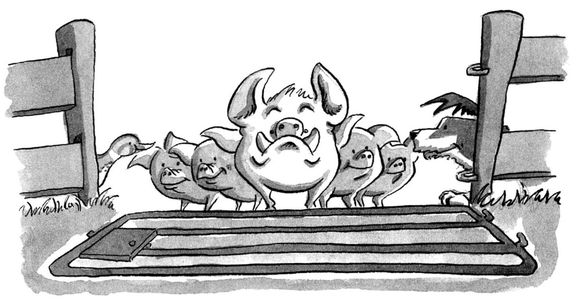
Before long, there were grumblings of discontent in the ranks.
“I'm tired” and “My feet hurt” and “I'm starving hungry” and “I've had about enough of this,” the sows complained, and finally the fattest
of them, Mrs. Roly-Poly, simply lay down in the road. Firingclose General Lord Nicholas of Winningshot heard the patter of hoofs cease behind him and turned to see that all the sows had stopped.
of them, Mrs. Roly-Poly, simply lay down in the road. Firingclose General Lord Nicholas of Winningshot heard the patter of hoofs cease behind him and turned to see that all the sows had stopped.

“What is this?” he grunted. “Is this mutiny?”
“Don't know what the place is called, General,” said Mrs. Chubby, “but we're not going any farther, not till we've had a rest and a bite to eat. My trotters are worn out.”
This brought from the General a long lecture, very military in tone, on duty and discipline, and for a while the sows lay in the road, not listening to a word but simply resting and catching their breath. But when the boar paused to catch his, Mrs. Tubby said, “Don't forget, General, that an army marches on its stomach.”
The General glowered at her. Then it occurred to him that his own stomach was feeling remarkably empty.
“Mrs. Tubby,” he said, “you took the words right out of my mouth. I was merely waiting until we found a suitable source of food,” and, after a short lecture on the importance of a balanced diet, he set off again, the sows reluctantly following.

Not half a mile on, they came upon an open gateway and, beyond it, a fine crop of sugar beets.
Eagerly the hungry pigs fell upon this bonanza, tearing and swallowing the green leafy tops and ripping great chunks out of the sweet roots in the ground beneath, eating and eating until at last they could hold no more, and even the General was speechless.
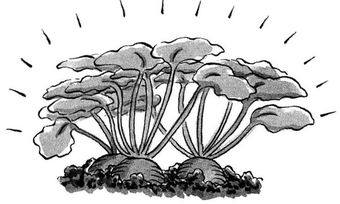
They lay in the ruined crop and snored, and none of them saw a brown-and-white duck flying over the sugar-beet field.
“Looks like they've struck it lucky,” Damaris told Rory when she arrived back at the farm.
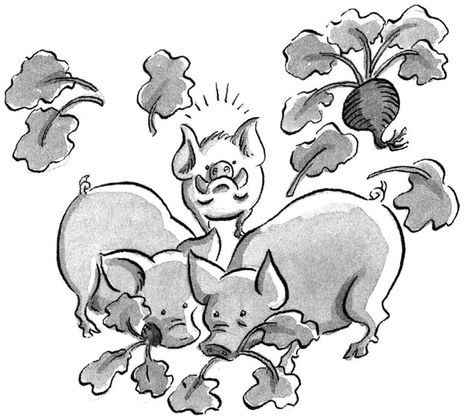
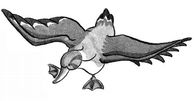
“Took me a bit of time, but when I did find them, they'd gorged themselves in a field of roots and were all lying there, blown out like balloons.”
“Good,” said Rory. “The happier they are, the less they'll want to come back here. We don't want things to go wrong for them so that they start to wish they were safely back in their old paddock.”
But it was not long before things started to go very wrong indeed for the General and his wives.
At first it looked as though he had led them to the promised land, so well did they feed. For a day and a half they stuffed themselves with sugar beets and sugar-beet tops. There was even a pond in the corner of the field, where they could drink and wallow. But then they began to pay the price.
“I don't know why, dear,” said Mrs. Portly to
Mrs. Stout, “but my guts feel funny.”
Mrs. Stout, “but my guts feel funny.”
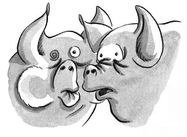
“Mine too,” said Mrs. Stout, and the other sows grunted agreement.
Mrs. O'Bese did not mince her words.
“I've got the trots,” she said, and before long they all had, the General included.
“In my opinion,” he said uncomfortably, “this unfortunate condition has been caused by an imprudent consumption of the fresh green tops of the sugar beets, acting as a purgative.”
“Tops or bottoms,” said Mrs. O'Bese, “I know which end of me is worse off. Come on, General, let's be getting out of here.”
So they did, marching off once more down the road and leaving upon its surface plentiful evidence of their troubles.
But worse was to come.
That afternoon the pigs reached the outskirts of a village. So far their journey had been through a countryside of few houses and isolated farms, but now they came upon a signpost saying
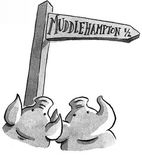
MUDDLEHAMPTON 1/2
Â
And shortly after that, there was an open gateway with a sign, which read
Â
MUDDLEHAMPTON CRICKET CLUB
PRIVATE
TRESPASSERS WILL BE PROSECUTED.
Other books
Finding Zero by Amir D. Aczel
The Wish Maker by Ali Sethi
Rogue Angel 46: Treasure of Lima by Alex Archer
Angels Don't Cry: A Biker Erotic Romance by Perry, Kay
What the Dog Knows by Cat Warren
Doomsday Brethren, Book 04: Entice Me at Twilight by Shayla Black
Raisin' Cain: The Wild and Raucous Story of Johnny Winter (Kindle Edition) by Sullivan, Mary Lou
A License to Wed: Rebellious Brides by Diana Quincy
The House of the Stone by Amy Ewing
Listen for the Lie by Amy Tintera